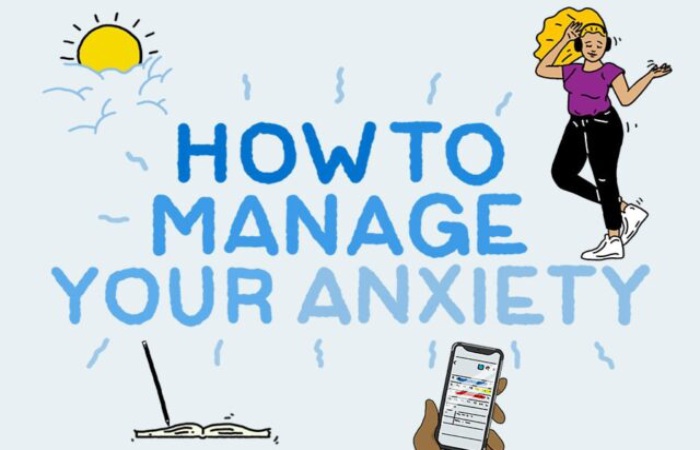Table of Contents
Introduction
At some point, Managing anxiety at home and stress affects everyone. But, of course, they can manifest differently in different people, and a person’s level of anxiety can vary. Still, one thing is sure: there are ways to manage stress, even if it seems to spiral out of control.
Of course, if managing anxiety at home interferes with your daily life and hinders your productivity for a long time, please seek help. find help
Information about causes and treatment helps you understand anxiety and stress, but there are also physical and mental things you can do when you feel anxious or stressed.
Coping Strategies – Managing Anxiety at Home

Try these when you’re feeling Managing anxiety at home or stressed:
- Take a break. Practice yoga, listen to music, meditate, massage, or learn relaxation techniques. Stepping back from the problem helps to clear your head.
- Eat balanced meals. Do not skip any meals. Have healthy, energizing snacks on hand.
- Limit alcohol and caffeine, which can increase anxiety and trigger panic attacks.
- Get enough sleep. When you are stressed, your body needs more sleep and rest.
- Exercise daily to feel good and maintain your health. Check out the formatting tips below.
- Breathe deeply. Inhale and exhale slowly.
- Slowly count to 10. Repeat and count to 20 if necessary.
- Do your best. Instead of aiming for impossible perfection, be proud of the distance covered.
- Accept that you can’t control everything. Then, put your stress into perspective: is it as bad as you think?
- Welcome humour. A good laugh goes a long way.
- Attitude maintains a positive. Try to replace harmful thoughts with positive thoughts.
- Rejoin. Volunteer or find another way to be active in your community that builds a support network and gives you a break from everyday stress.
- Find what triggers your anxiety. Is it work, family, school or something else you can define? Then, whenever you feel stressed or anxious, write in a journal and look for a trend.
- Talk to someone. Tell your networks and family that you are overwhelmed, and let them know how they can help you.
Be Active – Managing Anxiety at Home
Exercise releases feel-good hormones like endorphins that can improve your mood. Walk your dog, dance, run, play with your kids, or try anything that gets you moving. Meditation and deep breathing can also help.
Train your Brain.
Focusing on the present often helps relieve anxiety. Puzzles, crosswords, word searches, and other games can keep your thoughts from wandering.
Enjoy Nature.
Being outside has a calming effect. You also don’t have to climb a mountain to enjoy the benefits. A brisk walk in a park can hugely benefit your mentality.
Specify a Workspace.
If your job has moved from office to home, try separating your work and private life, such as turning a room in your home into an office and closing the door when completing your daily work. Alternatively, if you work in a more communal area of your home, gather your materials at the end of the day and put them away. It can help reduce anxiety from your job.
Connect with your Loved ones.
Sharing how you feel with supportive friends and family can help reduce anxiety and loneliness. It is likely that they have felt managing stress at home about things in the past or even experienced similar feelings—call, text or email people near you.
To be Careful – Managing Anxiety at Home
Make sure you listen to yourself and understand that you are feeling anxious.
Noticing your increased emotions can help you cope by signalling it’s time to seek help. Depending on your anxiety level, this may mean trying one of the above anxiety relief methods or seeking professional help.
Conclusion
Managing anxiety at home is a typical but highly subjective human emotion. Unfortunately, while normal anxiety serves a functional and adaptive purpose, anxiety can also be the cause of immense suffering for millions of people.

